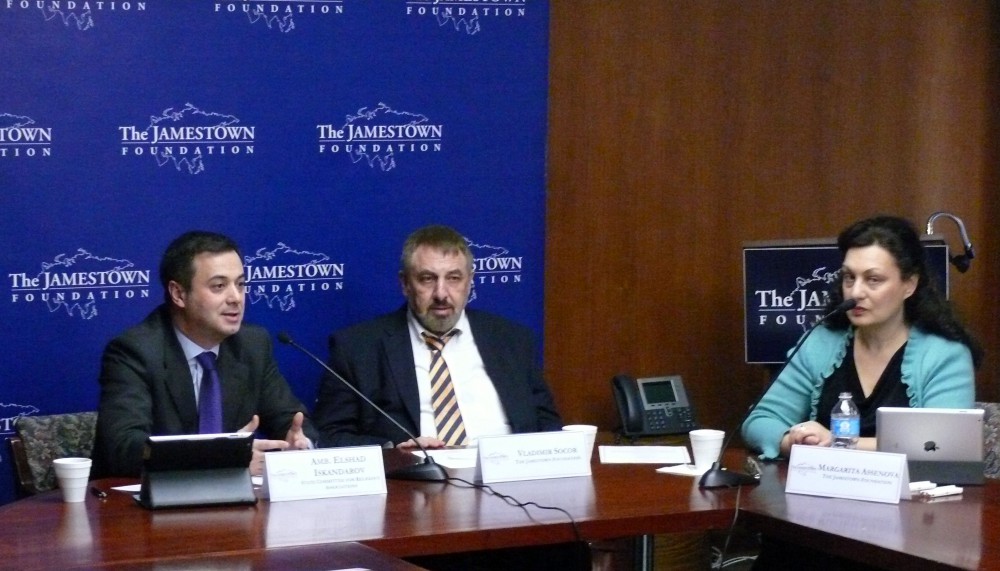The State Committee on Religious Associations of Azerbaijan, the Jamestown Foundation and Azerbaijan’s Embassy in USA hosted roundtable discussions on the topic “Interfaith Respect and Dialogue in Azerbaijan”.
The goal was to present the real situation on religion-state relations, the Azerbaijani model of tolerance, interfaith cooperation and mutual respect in the country to the US political and public circles.
Elshad Iskandarov, Chairman of the State Committee on Religious Associations of Azerbaijan, the Jamestown Senior Fellow Vladimir Socor led the discussions on the peaceful co-existence and mutual respect of different religious groups in Azerbaijan. Ambassador Iskandarov also talked about the division between secular and religious authority in the country and Baku’s interaction with its neighbours and international organizations within the sphere of religious policy.
The discussions also revolved around different religious groups, including the majority Shi’a and minority Sunni Muslims as well as adherents to various Christian denominations.
Mr. Socor opened the discussion by noting that religion in the South Caucasus is political in nature and an important aspect of national identity throughout the world. Yet, he also observed, religion can too easily be exploited by extremist groups seeking their own political ends. Socor further commented on Azerbaijan’s broader role within the Euro-Atlantic space. He argued that Azerbaijan had chosen a Western orientation for itself, which is reflected in the country’s energy exports to the West.
Chairman of the State Committee on Religious Associations of Azerbaijan Iskandarov described Azerbaijan’s tradition of tolerance and interfaith dialogue, which is “home grown” and a long-time feature of the country’s culture. As he noted, tolerance and inter-religious dialogue has historical roots that predate Azerbaijan’s statehood traditions. The Ambassador argued that religious pluralism in Azerbaijan is a consequence of the country’s location at the geographic crossroads of several continents and multiple peoples and ethnicities
Iskandarov also explained that Azerbaijan’s policy toward religions is to “do no harm” and to treat all faiths equitably while maintaining the state’s distance from any one particular religion. In that sense, he asserted, Azerbaijan is more secular than the other countries of the South Caucasus. He also commented on the 2009 amendments to Azerbaijan’s law on religion, which has significantly heightened scrutiny for the registration of religions in the country, stemming from a sudden appearance of religious extremism in Azerbaijan
Noting the words by President Ilham Aliyev “Multiculturalism is an integral part of Azerbaijan’s national identity”, Iskandarov stressed the huge work being done by the Heydar Aliyev Foundation, in particular, its president Mehriban Aliyeva, to create an intercultural and inter-religion dialogue platform.
Iskandarov stated that it is in Washington’s interest to support and promote Azerbaijan’s model of tolerance and inter-religious dialogue because its presence in a Muslim-majority country will have a greater chance of also being accepted in the rest of the Muslim world. The Ambassador concluded that Azerbaijan’s approach to religion is more relevant and more successful than a secularist model that lacks religious dialogue and tolerance.
Then, Chairman of the State Committee on Religious Associations of Azerbaijan Elshad Iskandarov answered questions.
AZERTAC

